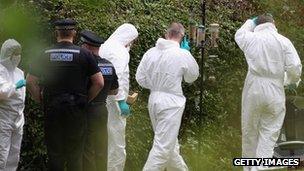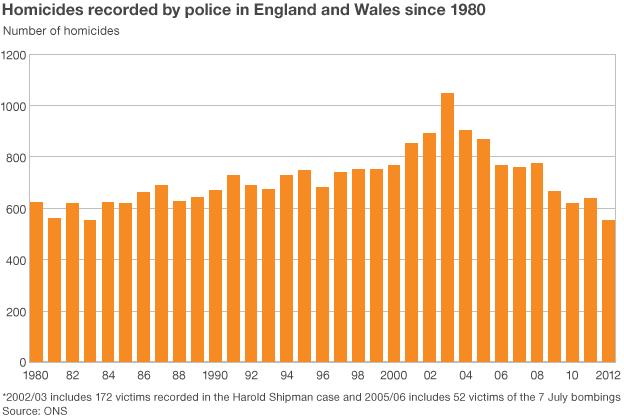Crime data: Homicide at 30-year England and Wales low
- Published

The number of killings reached a peak of nearly 1,000 a decade ago
The number of murders and killings in England and Wales has fallen to the lowest level in nearly 30 years, Office for National Statistics figures show.
Police recorded 550 homicides in 2011-12, 88 fewer than the previous year and the lowest number since 1983.
Offences such as pickpocketing, shoplifting and bicycle theft rose 2%, the only crime category to show a rise.
Separate data, based on interviews with 46,000 adults, suggests crime levels are broadly flat.
They were conducted as part of the Crime Survey for England and Wales (CSEW), previously known as the British Crime Survey, which asks people whether they have been the victim of any offences during the past year.
About 9.5 million incidents took place, according to the survey respondents.
'Other thefts'
The <link> <caption>ONS figures</caption> <url href="http://www.ons.gov.uk/ons/rel/crime-stats/crime-statistics/period-ending-march-2012/stb-crime-stats-end-march-2012.html" platform="highweb"/> </link> show crime recorded by police forces fell by 4% to below the four million mark for the first time since 1989.
Officials said the fall in homicide figures was not unique to England and Wales and there had been reductions in Europe, Asia and North America since the mid 1990s.
The number of homicides rose from around 300 a year in the 1960s to about 1,000 a decade ago. The number last year was the same as in 1983.
The figures also show attempted murders also fell substantially, indicating that the fall in homicides was not principally because surgeons were saving people's lives through advances in medical techniques, said BBC home affairs correspondent Danny Shaw.
The "other thefts" category also included people stealing items from garages and sheds and rose 4% the previous year. More than 1.1 million such incidents were recorded by police last year.
John Flatley, head of crime statistics at the ONS, suggested the increase was mostly driven by rises in thefts of metal, mobile phones and bags left unattended in pubs and bars.
He added the CSEW indicated that pickpocketing had risen 17% in the last two years and this "might represent an emerging upward trend mirroring that seen in the comparable recorded crime category".
Mr Flatley said the estimated 5,000 offences committed during last summer's riots had been "swallowed up by the larger volume reductions we've seen elsewhere".

The recorded crime figures also show:
Burglaries and vehicle theft both fell on the back of improvements in car and home security
Recorded violence against the person fell by 7%, continuing a downward trend in recent years
Robbery fell overall by 2% but was up by 8% in the Metropolitan Police area, the second year in a row that the force saw such an increase
Robbery offences fell 20% and 14% in the West Midlands and Greater Manchester Police areas respectively
The overall number of offences in 2011-12 was a third lower than in 2002-03
There were 30,999 offences involving a knife or sharp instrument, a 5% decrease compared with 2010-11
Provisional data shows 5,911 firearm offences were recorded - 16% down - of which 39 resulted in a death
Policing Minister Nick Herbert said the figures showed crime has continued to fall despite the challenge of reduced police budgets and "give the lie to the spurious claim that there is a simple link between overall police numbers and the crime rate".
He said the introduction of elected police commissioners in November would make forces more accountable for "areas of local concern" highlighted by the ONS.
The Association of Chief Police Officers (Acpo) said the figures were a "credit to those officers and staff who have faced the challenge of major efficiencies while continuing to tackle crime in our communities".
Separate crime figures were previously released by the Scottish Government and the Police Service of Northern Ireland. In 2011-12, Scotland's eight police forces recorded 3% fewer crimes than the previous year, while offences in Northern Ireland dropped 1.6% year-on-year.
- Published17 November 2011
- Published10 May 2012
- Published26 June 2012